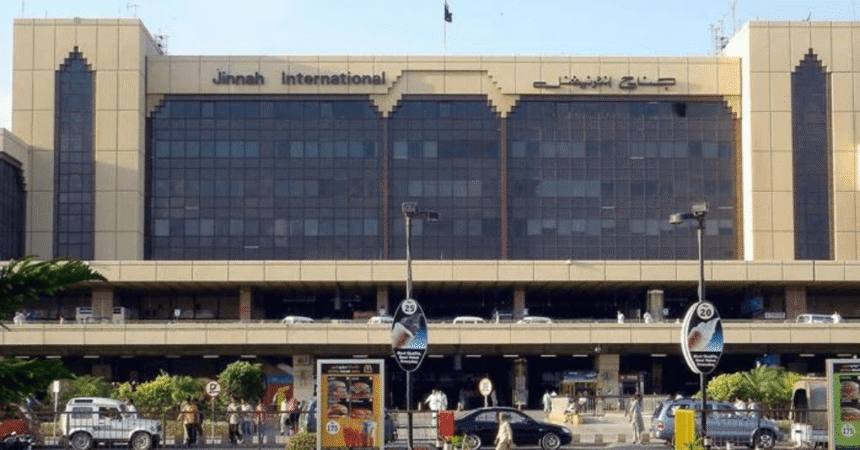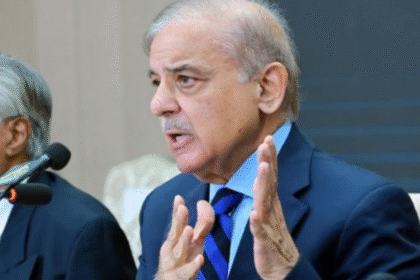In a significant enforcement action against illegal immigration practices, the Federal Investigation Agency (FIA) of Pakistan has apprehended eight individuals at the Jinnah International Airport in Karachi for attempting to travel abroad using counterfeit documents. This operation, carried out on Tuesday, underscores the persistent issues surrounding fraudulent travel documentation and the implications for Pakistan’s international reputation.
Overview of the Arrests
The FIA’s operations targeted two separate groups attempting to leave the country. In the first instance, five passengers were detained while trying to fly to Saudi Arabia under the guise of performing Umrah, a pilgrimage undertaken by millions of Muslims each year. The second group included three individuals trying to travel to Azerbaijan on supposedly legitimate study visas.
Saudi Arabia Operations
The first operation involved five individuals who, according to the FIA spokesperson, were found to have suspicious documents during the immigration clearance process. Their initial intention to travel to Saudi Arabia was ostensibly to engage in religious observance. However, upon further investigation, it was revealed that these passengers intended to beg upon their arrival in the Gulf state, a trend that has raised significant concerns among authorities regarding the misuse of pilgrimage visas.
Preliminary investigations indicated that these individuals were well aware of their intent to exploit the Umrah pilgrimage for monetary gain, rather than participating in a genuine religious experience. This raises ethical questions about the exploitation of religious opportunities for personal benefit, which can tarnish the sanctity of such practices.
Azerbaijan Operations
In the second operation, three passengers were detained while attempting to travel to Azerbaijan, claiming to possess study visas. However, their documentation was also deemed suspicious during the immigration checks. Among those arrested was Asim, a travel agent from Khyber Pakhtunkhwa, who allegedly facilitated their visa arrangements.
Asim’s dealings raised alarms, particularly concerning the amounts paid by the travelers for their visas. One passenger reportedly paid Rs800,000, while the others paid Rs300,000 each. These exorbitant fees and the dubious nature of the visas suggested a pattern of exploitation that necessitated further investigation.
Notably, Muhammad Hussain, one of the arrested individuals, was identified as an employee of the Capital City Police in Peshawar. He attempted to travel without obtaining a No Objection Certificate (NOC) from his department, further complicating the situation. This incident highlights the risks that individuals associated with law enforcement face when engaging in illegal activities, potentially compromising their professional integrity.
Implications of the Arrests
These arrests come at a critical juncture when several Gulf countries have voiced concerns regarding the behavior of Pakistani expatriates. During a recent session of the Senate Standing Committee on Overseas Pakistanis, Secretary Overseas Pakistanis Dr. Arshad disclosed that nations such as the United Arab Emirates, Saudi Arabia, Qatar, and Kuwait had expressed reservations about the actions of Pakistani nationals abroad.
The discussions highlighted a troubling trend: a significant number of individuals traveling abroad under the pretense of religious observance or education were engaging in begging or other illicit activities upon arrival. This exploitation not only affects the individuals involved but also jeopardizes the reputations of those genuinely seeking to travel for legitimate reasons.
Broader Context: The Rise of Exploitative Travel Practices
The phenomenon of individuals misusing travel opportunities is not unique to Pakistan. Globally, there are ongoing challenges related to immigration fraud, where individuals attempt to manipulate systems designed for legitimate travel. However, the situation in Pakistan has garnered particular attention due to the frequency with which nationals are reported to engage in begging abroad under the guise of pilgrimage.
Reports indicate that a substantial number of Pakistani nationals who leave for countries like Saudi Arabia and Iraq do so under religious pretenses, only to participate in begging-related activities. In fact, according to official statistics, a staggering 90% of beggars arrested in certain regions were found to be Pakistani nationals.
The Role of Travel Agents in Facilitating Fraud
The involvement of travel agents in facilitating fraudulent travel documents has become a critical issue that authorities need to address. Agents like Asim play a significant role in orchestrating these schemes, often exploiting the aspirations of individuals seeking better opportunities abroad. The fees charged by these agents can be exorbitant, and they often make unrealistic promises about visas and travel arrangements.
The FIA’s crackdown on these practices is essential in curbing the activities of unscrupulous agents who prey on vulnerable individuals. Increasing the scrutiny of travel agents and implementing stricter regulations could help prevent future cases of immigration fraud. Additionally, creating a system of accountability for agents can ensure that individuals seeking to travel are provided with accurate information and legitimate services.
Legal Consequences for Arrested Individuals
The individuals arrested during these operations face serious legal repercussions. Engaging in fraudulent activities related to travel can result in severe penalties, including imprisonment and hefty fines. The FIA is committed to addressing these issues and has indicated that further investigations will be conducted to ascertain the extent of the fraud and the involvement of others in these schemes.
In addition to the immediate legal consequences, individuals caught in these situations may also face long-term implications for their ability to travel in the future. A criminal record related to immigration fraud can significantly hinder future opportunities, not only for international travel but also in securing employment and educational opportunities.
The Need for Public Awareness and Education
One of the most effective ways to combat the growing issue of immigration fraud is through public awareness and education. Many individuals seeking to travel abroad may not be fully aware of the risks associated with engaging in fraudulent practices or relying on dubious travel agents.
Government agencies and non-governmental organizations can play a crucial role in educating potential travelers about their rights and the legitimate processes for obtaining visas. Workshops, seminars, and informational campaigns can help individuals make informed decisions and avoid falling victim to fraudulent schemes.
Community and Cultural Considerations
The exploitation of religious pilgrimage for personal gain poses significant cultural and ethical challenges. Pilgrimage, particularly the Umrah, holds profound spiritual significance for millions of Muslims. Misusing such opportunities for monetary gain undermines the integrity of these practices and could lead to broader societal consequences.
Community leaders and religious organizations must also take an active role in addressing these issues. Promoting ethical behavior and emphasizing the spiritual values associated with pilgrimage can help dissuade individuals from exploiting these opportunities. Encouraging community engagement in discussing the implications of such actions can foster a culture of integrity and respect for religious practices.
Future Directions for Policy and Regulation
To effectively address the challenges posed by immigration fraud and the misuse of travel opportunities, a comprehensive approach is required. This includes:
- Stricter Regulations for Travel Agents: Implementing a licensing system for travel agents that requires them to adhere to ethical practices can help reduce the incidence of fraud. Regular audits and monitoring of their activities will ensure compliance.
- Enhanced Immigration Checks: The FIA and other relevant agencies should conduct thorough checks on travelers, particularly those seeking to travel for religious or educational purposes. Increased scrutiny during the immigration clearance process can help identify suspicious activities before they escalate.
- Public Awareness Campaigns: Launching campaigns to educate the public about the risks of immigration fraud and the importance of adhering to legal processes can empower individuals to make informed decisions.
- Collaboration with Foreign Governments: Strengthening collaboration with countries that host Pakistani expatriates can facilitate the exchange of information about fraudulent practices and help mitigate the issue.
- Support for Genuine Travelers: Providing support and resources for individuals seeking legitimate travel opportunities can encourage ethical behavior. This could include scholarships for study abroad programs or assistance in securing legitimate job opportunities.
The recent arrests by the FIA at Karachi’s Jinnah International Airport underscore the urgent need to address the pervasive issue of immigration fraud in Pakistan. As individuals seek opportunities abroad, the temptation to exploit religious or educational travel for personal gain can have far-reaching implications, not only for the individuals involved but also for the reputation of the country as a whole.
The actions taken against those attempting to travel on fake documents serve as a crucial reminder of the importance of compliance with legal processes. It is imperative for government agencies, community leaders, and travelers themselves to work collaboratively in fostering an environment that prioritizes integrity and ethical behavior in international travel.
By addressing the root causes of these issues and promoting legitimate pathways for travel, Pakistan can safeguard the values associated with its cultural and religious practices while ensuring that its citizens are afforded the opportunities they seek in a responsible and lawful manner.
#FIA #KarachiAirport #ImmigrationFraud #Pakistan #Travel #VisaFraud #Umrah #Azerbaijan #PublicAwareness







